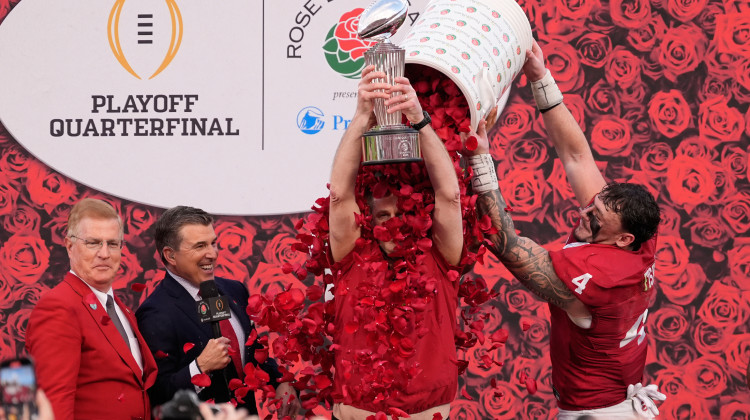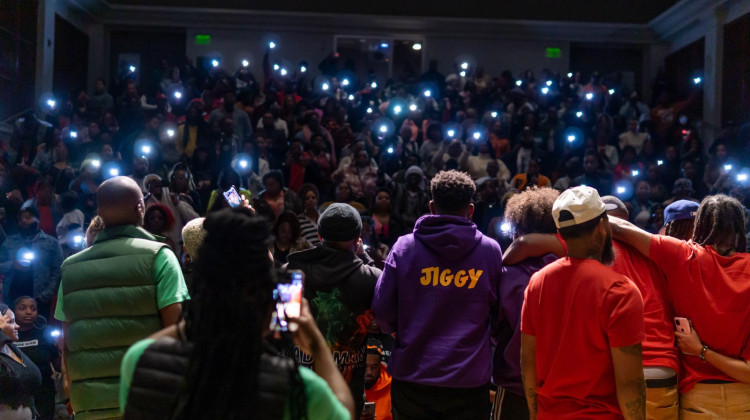
The exhibition would have included Halaby's work from 1963 to 2019. This photos shows Halaby's 2016 "Our Beautiful Land Palestine Stolen in the Night of History."
Courtesy of Madison GordonIndiana University’s Eskenazi Museum of Art canceled a Palestinian–born artist’s exhibition after three years of preparation.
“Samia Halaby: Centers of Energy,” was canceled Dec. 20 after a two-sentence letter from the museum’s leadership, said Madison Gordon, a board member of the Samia Halaby Foundation. Gordon said Halaby’s team was told the exhibition was canceled for security reasons.
Gordon, also Halaby’s grand-niece, said she helped set up the exhibition with Halaby’s studio.
The exhibition was set to run Feb. 10 to June 9, 2024.
Halaby attended Indiana University as an MFA student in 1963. She was an associate professor from 1969-72, and her work has been shown at IU before. Halaby is regarded as a pioneer in twentieth-century abstract art and one of Palestine’s most acclaimed artists.
Gordon created a public petition to reinstate the exhibition after what she calls multiple failed attempts to receive an explanation from IU or the museum. Gordon said President Pamela Whitten has the power to reverse the decision and honor IU’s mission to support diversity and world-class education.
“We are hopeful that she will,” Gordon said, “We think it will send a really powerful, great message to the university community to reinstate the show.”
Gordon said IU and the museum did not provide any examples of security threats to the art or the campus. IU and the museum declined WFIU’s request for an interview, but IU spokesperson Mark Bode provided an emailed statement.
“Academic leaders and campus officials canceled the exhibit due to concerns about guaranteeing the integrity of the exhibit for its duration,” Bode wrote.
Gordon said she and Halaby called and wrote to the university for weeks before making the petition public. They asked to have a conversation on the expected security concerns.
“If there were credible threats, wouldn't they talk to us about that?” Gordon said “And, frankly, the singular mission of a museum is to care for artworks to protect their safety, and make them exhibited well to the public.”
Gordon said for three years, the museum’s curators and staff worked to create an exhibition exclusive to IU and Michigan State University; Halaby is an alum of both. Grants from the National Endowment for the Arts and the Terra Foundation for the Arts were secured.

IU and the museum also published a book with the same name as the exhibition, featuring Halaby’s writing and art. The special collaboration went smoothly until December, Gordon said.
Gordon reiterated that the museum, faculty, staff, students and Bloomington locals would benefit from the exhibition. She said IU’s mission includes supporting diversity and minority artists.
“Samia Halaby is a very respected painter,” Gordon said. “It would be a shame for students to be denied that opportunity, simply because she's Palestinian.”
In three days, Gordon and Halaby’s petition has been signed by more than 3,000 people. It’s a grassroots effort, Gordon said. She hopes local, national and international support will encourage IU to let the show continue.
Gordon said she believes the cancellation is due to current events.
After the start of the Israel-Hamas War on Oct. 7, IU has seen multiple incidents surrounding antisemitism and disagreement over pro-Palestinian organizations.
In November, two IU undergraduate student governments resigned, citing antisemitism among the group’s leadership and a refusal to acknowledge Jewish student’s concerns on campus.
This caused Rep. Jim Banks (R, IN-03) to write in a Nov. 16 letter to IU President Pamela Whitten that the university is failing to combat antisemitism. Banks threatened that IU could lose federal funding. He also took aim at student activists with the IU group, calling pro-Palestinian demonstrations "pro-terrorist.”
Faculty spoke out against Banks. They responded with a letter committing to academic freedom and freedom of expression for all students — even students who do controversial things such as protesting.
Read more: IU faculty respond to Rep. Jim Banks in letter defending academic freedom
An IU associate professor and Palestinian Solidarity Committee advisor was suspended in December, days after Halaby’s exhibition was canceled. Faculty called out IU administration for bypassing the university policy of a hearing among his peers to punish the professor.
Halaby has a long, public record of activism and support of Palestine.
“I think that the university started feeling the need to distance themselves from Samia, who is Palestinian herself, and has been a supporter of freedom, dignity and self-determination for the Palestinian people,” Gordon said.
 DONATE
DONATE






 Support WFYI. We can't do it without you.
Support WFYI. We can't do it without you.